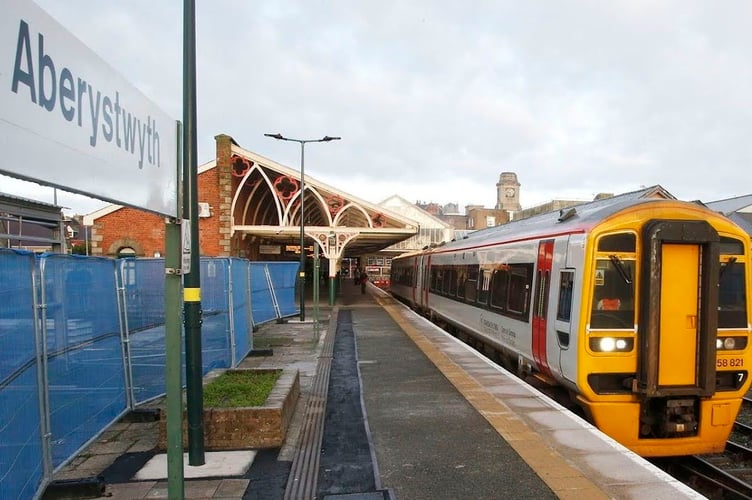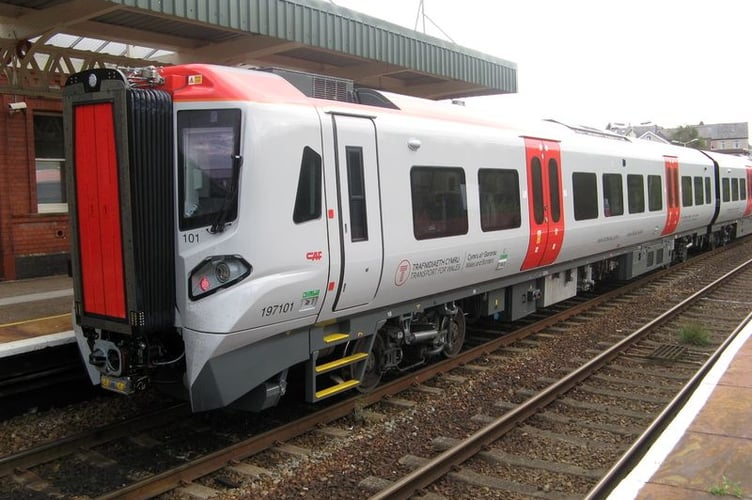Train services in mid and north Wales are “not good enough”, with overcrowding “bordering on dangerous” and a “change of direction” is needed if the situation is ever to improve, an association representing councils across the region has said, after a survey revealed the extent of problems with delays, cancellations, overcrowding and falling passenger satisfaction.
The survey, undertaken by the North & Mid Wales Association of Local Councils, was launched in response to what the association called “deep concern regarding overcrowding, particularly on long journeys” and “trains running late on a regular basis”.
It comes as Transport for Wales continues its “transformation programme” of services which includes updated timetabling, newer trains and station improvements that were delayed by the Covid-19 pandemic.
The survey – which covers the Cambrian Coast, Cambrian Main, Shrewsbury-Chester and North Wales Coast lines – found incidents of a family with young children having sit on their cases in the toilet as there was no other space available; a mother sitting on the floor with a young baby due to lack of space; and more people on the train then seats available with passengers standing for periods of more than an hour.
It found “trains running late on a regular basis” which “caused stress to those needing connections”.

While surveys have been conducted on the Cambrian lines regularly since 2013, this is the first report to look at the situation on both the North Wales Coast and Shrewsbury-Chester lines.
The report found that trains are “extensively overcrowded” and suffer from a lack of rolling stock “due to the slow arrival of new trains”.
“Cancellations and delayed trains have become commonplace,” the report found, with both information at stations and on trains being “unreliable” and “often conflicting”.
While the report found that “investment into the infrastructure” of the lines “has been extensive”, problems for passengers persist.
“Progress in many areas is slow and cumbersome,” the report said, and called for changes to be made including “new and faster trains”, “improved timetables”, and bigger trains and more carriages “to meet the growing public demand”.
The survey – which was carried out in August on services including those between Shrewsbury and Aberystwyth; and Machynlleth and Pwllheli – found a drop in regular train use among passengers “due to reliability and overcrowding”.
It found that 44 per cent of trains were on time on the North Wales line, with more than half late or cancelled.
On the Cambrian Main line between Shrewsbury and Aberystwyth, it was found that 49 per cent of trains arrived on time during the day of survey – with 10 per cent of trains cancelled and running more than 20 minutes late.
The survey found that some trains between Machynlleth and Aberystwyth remained over capacity, with some services reaching a “dangerous” level of overcrowding.
Passengers are reported in the survey as saying that “train travel was now more stressful than previously” with the “general view that severely overcrowded trains are unsafe”.
“Several families were sitting on the floor” on the Cambrian services during the survey day, while “one family had children sitting on cases in the toilets” to find a place to sit.
“Another passenger was a pregnant mother with a small child in her arms sitting on the floor,” the report added.
“
Cancellations and delayed trains have become commonplace.
The North & Mid Wales Association of Local Councils survey
On the Cambrian Coast line, 53 per cent of trains arrived on time with two services on the day cancelled completely.
Again on the coast line, passenger numbers were bigger than the capacity of the train.
One particular service to Pwllheli with 136 seats “had 170 passengers at one point at Barmouth and this continued with 150 plus from Tywyn to Machynlleth,” the report found.
That survey was carried out on a Saturday.
A mooted plan to have regular two carriage trains of the new 197 class would cut capacity by around 20 seats compared to the current trains and exacerbate the problem, the report found, with passenger number outstripping capacity by even more.
“Health and safety will be put severely at risk if the plan for this goes ahead,” the report warns.
“The reduction in proposed capacity on this line appears not to work – the numbers using the service are too many.
“A one train fits all was misguided and wrong.
“There are commuter services and long distance services in Wales and the 197 units do not fit both.
“The overcrowding on many trains (on all the lines surveyed) is at an unacceptable level and when measured against the proposed 197 class units leads us to state that levels expected when they are introduced will be unsafe and bordering on dangerous.”
The report calls for “alternatives to be sought to stop what is heading for a catastrophic situation on the Wales railways.”
It calls for all trains to be a three or four carriage minimum, with four during the summer months on the Cambrian Coast and for the line between Aberystwyth and Birmingham.
“Cost should not be an issue when people’s lives are put at risk,” the report says.
“There is no way that a single train is suitable for commuting and long distance.”

While the survey identified clear weaknesses in response to overcrowding, reliability, and other facilities such as toilets, the “overall customer satisfaction is better than expected” across the lines, the report found.
Cllr Captain Ian Hodge, chair of the North & Mid Wales Association of Local Councils, said: “The reason for the survey was a deep concern regarding overcrowding, particularly on long journeys.
“The new trains have less seats than the current ones in use and are of ‘commuter train’ design.
“In the view of the association these trains are not for long distance journeys.
“In the view of the association the new trains do not meet what is needed and indeed are now of the view that overcrowding is so bad it is unsafe, bordering on dangerous.”
As the Cambrian News reported last month, a separate passenger survey organised by Transport Focus, found that Transport for Wales has the worst overall customer satisfaction of any train company in the UK, with scores for reliability, value for money, and cleanliness plummeting in the past 18 months.
Jan Chaudhry-Van der Velde, chief operating officer at TfW, said last month that he expects services to improve after a “transformation program” is completed.
“After years of stagnation, there is a huge railway transformation program being delivered on this network and while we make these investments, parts of the railway have been like building sites throughout 2023,” he said.
“As we modernise and enhance infrastructure and rolling stock, it’s undoubtedly been a painful period for our passengers with many rail replacement bus services in operation.
“Our new trains have been delayed by the pandemic so our older trains have had to carry on longer than intended, but the good news is the new trains are now arriving and will continue to replace the old ones throughout the rest of this year and into 2024.
“We’ve invested more than £1 million in station improvements and improved customer information systems.
“This includes launching an online map showing exactly where your train is at any given time, new customer information screens at our stations and mobile customer information points as well.”
The North & Mid Wales Association of Local Councils said its survey and report has been submitted to Welsh Government, Transport for Wales and the Health & Safety Executive.
The association said that another survey will be completed this autumn, with another scheduled for when new trains arrive on mid and north Wales lines to see if the situation has improved.
Have your say on the issues that matter to you. Get in touch today: email [email protected]


-with-her-son-Rufus-her-partner-and-younger-son-Noah.jpeg?width=209&height=140&crop=209:145,smart&quality=75)

